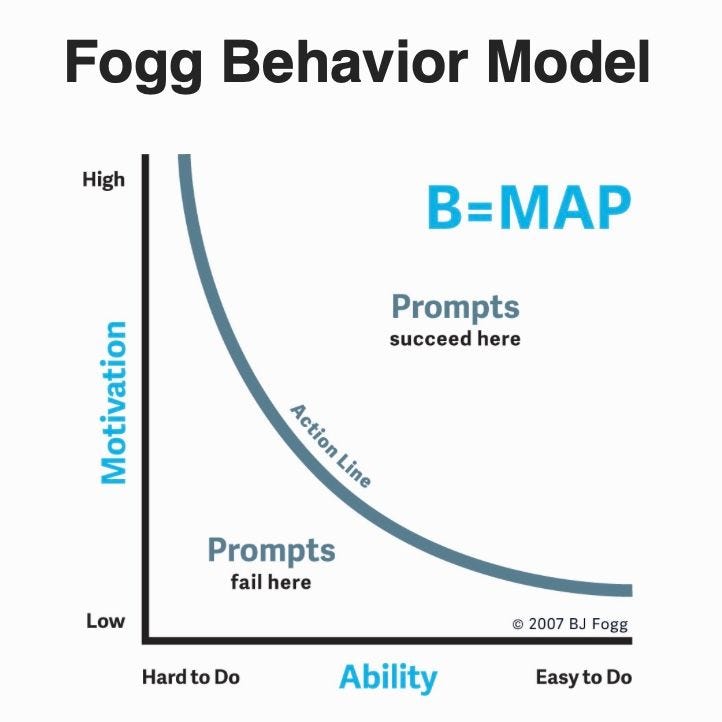Mental Pivot #41: Regaining Momentum
Drawing inspiration from the Fogg Behavioral Model, overcoming overthinking, and products vs. subscriptions.
And we're back…
I'm not gonna lie, taking two months to recharge and drop-out from the internet and everyday life was great.
Taking a break from the newsletter rekindled my desire to resume it, but there's no denying that the break also killed any momentum I had generated over the past year. Despite my best intentions, the inertia of restarting the newsletter was very real.
Fortunately, I didn't need to look far for inspiration to get things back on track.
The Fogg Behavioral Model is one frequent source of inspiration.
The Fogg Behavioral Model, per its inventor BJ Fogg, states that "Behavior (B) happens when Motivation (M), Ability (A), and a prompt come together at the same moment."
It's a tool for understanding why some behaviors occur and others don't. For instance, a vibration from your smartphone is a prompt. If your phone buzzes AND you simultaneously crave social interaction (motivation), you might quickly pull out your phone and dash off a response (ability) to a text message from a friend.
Per Fogg, if one of the elements is missing or insufficient, the above action of sending a text message will not occur. For example, if you aren't craving social interaction (motivation), you might ignore the smartphone vibration altogether. Your text message won’t be sent in that moment.
Visually, the model can be represented like this:

Motivation isn't always reliable, but ability is something that can be tweaked. If a task is too difficult or motivation is low, one strategy is to simplify said task by breaking it into smaller sub-tasks or more manageable portions. In Fogg's parlance, make it "tiny." For instance, start with a single pushup rather than three dozen. If you're writing something, like a newsletter (cough cough), draft 50 words rather than 1000 in a sitting. Fans of James Clear might also recognize this as a keystone of "atomic" habits. Yes, it’s common sense, but it works when applied consistently.
That's been the personal mantra this week: focus on the ability variable in the equation. Simplify the tasks. Do a little every day. Slowly rebuild momentum, motivation, and good habits through small, consistent wins. These are basic ideas, but they never go out of style.
If you want to delve further into Fogg's ideas, check out this TEDx talk he gave, Forget Big Change, Start with a Tiny Habit or his book, Tiny Habits (a worthwhile read).
Now onto the updates…
Productivity
Several of the productivity links in this week's edition echo the sentiment from above: keep it simple and take small actions. Good productivity advice needn’t be complicated.
Making Humans Indistractable with Nir Eyal: The Growth Mindset podcast interviews Nir Eyal, author of "Hooked" and "Indistractable." Eyal covers a wide range of ideas about taming our internal triggers and creating strategies for gaining traction in our everyday life. If you're having trouble generating forward momentum and taking action in your life, Eyal’s ideas are a good place to start.
Overthinking: Sylvain Kerkour reminds us to "stop trying to connect all the dots ahead of time. Embrace uncertainty and start doing."
The Unreasonable Effectiveness of Just Showing up Every Day: Kishore Nallan ponders the long-term impact of a simple adage: I shall write some code every day before or after work. Six years later, he has an impressive set of results to reflect on.
The Value of Doing a Little: "Bouncing back from a skipped day takes incredible mental fortitude. Yet strangely, bouncing back from a day in which you’ve done a little more than the bare minimum is orders of magnitude easier."
Articles
The American Diversity Meat Grinder: Antonio García Martínez, entrepreneur and author of Chaos Monkeys, is a controversial figure (he was fired two days after being hired at Apple for sexist comments published in his book). Nevertheless, he raises interesting questions and criticisms about the diversity narrative in Silicon Valley and the clash between advocates of equal opportunity and and those for equal outcomes. Note that his focus is racial diversity, there’s little mention of other types of diversity (like gender diversity).
Hou Yifan and the Wait for Chess's First Woman World Champion: Louisa Thomas' longform New Yorker piece profiles Hou Yifan, the only woman currently ranked in the top 100 best chess players in the world. Hou had the talent, skills, and ability to rank among the very best and succeed in this male-dominated sport, but she had other plans and ambitions.
It Looks Like a Product but Is Secretly a Subscription: Short exploration on two different ways to spend money: 1) capital expenditure (outright purchase and own) and 2) operational expenditure (recurring payments that give you access to a product or service). Some products, like cheap inkjet printers, are really subscriptions masquerading as products (i.e., consumers unwittingly committing to a steady supply of future printer cartridges).
It's a Good Thing I Don't Care What You Think: Philosophy professor Michael Huemer considers several reasons why academic writing is so uninspiring and tepid: "Academic writing is bad because academics are trained to write to avoid criticism, not to draw interest." Contrast with the opposite end of the spectrum (social media, some media outlets, etc.) where writers optimize for outrage and attention-seeking.
U.S. Kids Are Now Getting Nearly 70% of Their Calories from 'Ultra-Processed' Foods: Ultra-processed foods are those heavily altered with additives like fats, starches, sugars, dyes, and stabilizers (as opposed to minimally processed foods that are consumed as the naturally occur). A recent JAMA (Journal of the American Medical Association) investigation studied food trends in American youths over the past 20 years (link to the abstract); the findings are not good. This article reminds me of an excellent book from 2005 titled "Hungry Planet" in which a photojournalist created a visual record of what different families around the world eat over the course of a week. This 2013 article provides a visual sampling of the book's contents, Hungry Planet: What the World Eats in Pictures which vividly illustrates which populations are consuming more processed foods than others.
What China Wants and Why: An oversimplified analysis by a non-expert Westerner? Perhaps. At the very least, I find geography-based analyses about national goals and policies intriguing. It reminds me of Tim Marshall's excellent book, Prisoners of Geography: Then Maps that Explain Everything about the World which follows a similar line of inquiry.
Why Some of the Smartest People Can Be so Very Stupid: Interesting ideas on what stupidity is and how it manifests. Stupidity "occurs when you don't have the right conceptual tools for the job. The result is an inability to make sense of what is happening and a resulting tendency to force phenomena into crude, distorting pigeonholes."
Odds & Ends:
Pique is a mobile app that takes the lessons from popular non-fiction books and highlights key takeaways alongside interactive "learning experiences" to help users better understand those lessons. For instance, to learn the basic concepts of Leidy Klotz's book "Subtract," you'll engage in a visual puzzle that illustrates how subtractive thinking can yield a better solution than additive thinking. The interactive elements aren't quite as compelling as they could be, but it's still a neat concept. If you've tried services like Blinkist, Pique offers an even more "digestible" approach to consuming pop non-fiction. It's iOS only for now and free (presumably due to its limited content library).
Disboard is a directory for finding discord servers for a wide range of topics: gaming, anime, music, writing, dating, politics, and much more.
The UK's Royal Museums Greenwich have posted a shortlist of jaw-dropping astronomy photos vying for 2021's "Astronomy Photographer of the Year." Check out the finalists in advance of the selection of a winner next month if you want to be awed by some serious eye candy.
Thank you for subscribing to the Mental Pivot Newsletter. If you’re enjoying it, be sure to share it with your friends and spread the word.
I want to be able to deliver a top-notch newsletter to all of you. To that end, I’d love to hear your thoughts on what’s working, what doesn’t, and things you’d like to see more of. You can reach me by replying directly to this email or by adding a comment on Substack.
If this newsletter was forwarded to you, visit this link to subscribe.
Alternatively, you can also read the full archive of posts, book notes and link roundups on my blog: https://mentalpivot.com.



Great read as always David and I enjoyed the review of BJ Fogg model. Always worth a re-read!
As always wish I had more time to read all the links!
Horrifying! "U.S. Kids Are Now Getting Nearly 70% of Their Calories from 'Ultra-Processed' Foods"
Super interesting - "The American Diversity Meat Grinder"